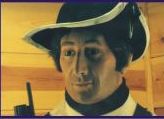Sergeant Charles Floyd was born in Kentucky, and was among the first to volunteer for service in the Corps, joining on August l, 1803. Among those included as one of the “Nine young men from Kentucky,” Floyd was a cousin of the expedition’s Sergeant Nathaniel Pryor. Considered a “man of much merit” by Captain Clark, he kept an uninterrupted daily record from May 14, 1804, until August 18, two days prior to his untimely death on August 20. Floyd’s death was the only fatality among expedition members during the two years, four months and nine days of their transcontinental odyssey.
 Floyd’s published journal reproduces verbatim his inspired spelling and fractured grammar, characteristics found also in the journals of the two captains and the four enlisted men who kept journals. Floyd’s journal has been published jointly with that of Corps member, Sergeant John Ordway, as Volume 9, The Journals of the Lewis & Clark Expedition, Gary E. Moulton, Editor, 11 volumes to date (University of Nebraska Press, Lincoln, 1995).
Floyd’s published journal reproduces verbatim his inspired spelling and fractured grammar, characteristics found also in the journals of the two captains and the four enlisted men who kept journals. Floyd’s journal has been published jointly with that of Corps member, Sergeant John Ordway, as Volume 9, The Journals of the Lewis & Clark Expedition, Gary E. Moulton, Editor, 11 volumes to date (University of Nebraska Press, Lincoln, 1995).
Floyd’s entries are laconic but factual. In the spirit of President Jefferson’s instructions and perhaps drawing from an agrarian background, Floyd judged land quality, including soil conditions, enroute up the Missouri. Contributing his personal assessments of what he observed, Floyd, on May 25, 1804, wrote, “[T]he land is Good & handsom the Soil Rich;” June 4, “[A] Butifull a peas of Land as ever I saw.” On June 7, he recorded his own interpretations of Indian pictographs as “pictures of the Devil and other things.” Floyd’s August 7 entry is the only detailed description of Private Moses Reed’s “Desarte [desertion] from us with out aney Jest Case [just cause].”
Unfortunately, Floyd’s contributions to the journey, together with his journal, ended with his premature death. As “Diagnosed” by the captains, Floyd’s illness was considered to be a “bilious cholic.” They could not be faulted for preventing his death, which medical historians have concluded was from a ruptured appendix.
Captain Clark’s journal entry for August 20, reads: “Sergeant Floyd much weaker and no better…Floyd as bad as he can be no pulse & nothing will stay a moment on his Stomach or bowels. Floyd Died with a great deal of Composure, before his death he Said to me, ‘I am going away I want you to write me a letter.’ We buried him on the top of the bluff. 1/2 Mile below [is] a Small river to which we Gave his name, He was buried with the Honors of War much lamented, a Seeder post with the Name Sergt. C. Floyd died here 20th of august 1804 was fixed at the head of his grave. This Man at all times gave us proofs of his firmness and Determined resolution to doe Service to his Countrey and honor to himself. after paying all the honor to our Decesed brother we camped in the Mouth of floyds River about 30 yards wide, a beautiful evening”
Today, Floyd enjoys the honor of having had erected at his gravesite in present Sioux City, Iowa, the most prestigious memorial of the explorers. A 100 foot high sandstone masonry obelisk, second in size only to that of the Washington Monument, was dedicated in fitting ceremonies on Memorial Day 1901. Dedication speaker for the occasion was Dr. Elliott Coues, editor of the 1893 annotated reprint of the 1814 Biddle Allen edition of the journals. Coues spoke eloquently of the exploring enterprise:
“I must confess that I am what my friends call me – ‘a Lewis and Clark enthusiast.’ But I do not think that anyone can read that ‘national epic of exploration’ without sharing my enthusiasm. It is one of the grandest episodes in the history of our country. Every American can be proud of it. Every person in Missouri, Iowa, Kansas, Nebraska, South and North Dakota, Montana, Idaho, Oregon and Washington – for the expedition passed through all these states – has an interest in the immortal achievements of these dauntless pioneers. For every Iowan this interest focuses about the saddest incident of the whole journey – the death of Charles Floyd.”
Content: PBS.ORG
Photo: FindAGrave.com added by Mike Remkus
